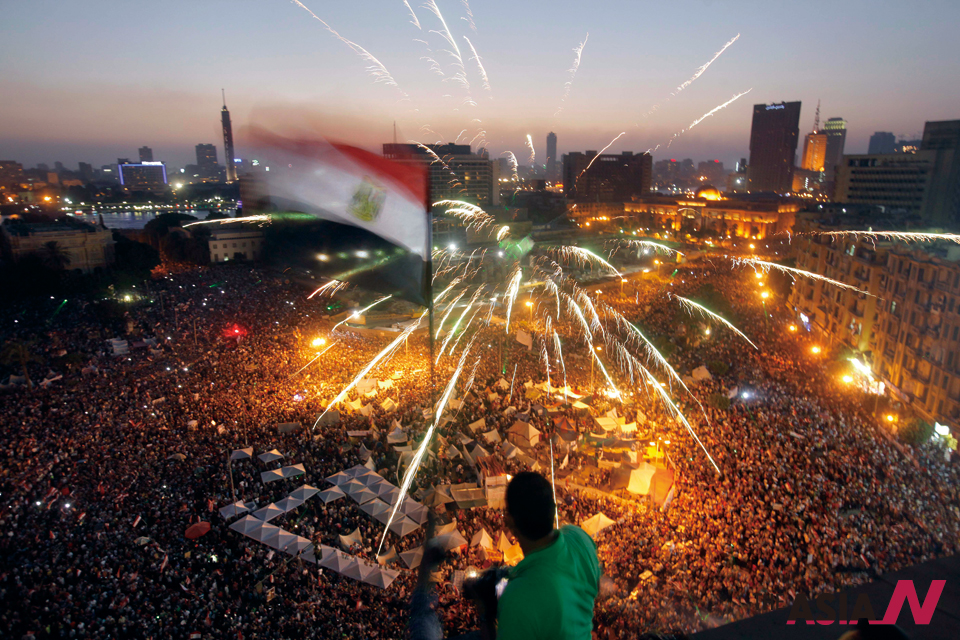
Seeking for Egypt’s true future
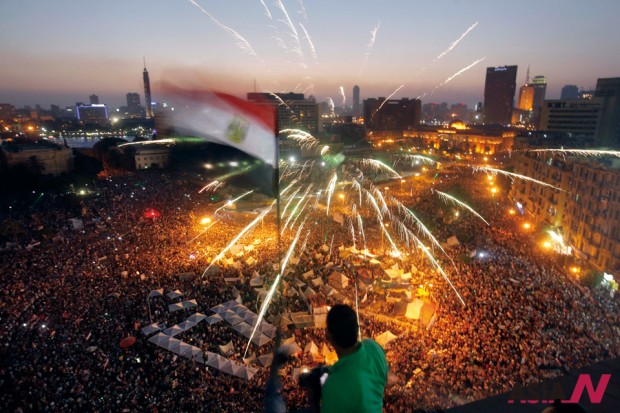
The 30 June Revolution could be the key gate to understand the future of Egypt. In 2012, Egyptians were ready to support the Muslim Brotherhood man who won the presidential race under one certain condition; he accepts and acts like a democratic ruler of all Egyptians. But this did not happen, as Mohammed Morsi continued, for a full year, to commit the mistake of dividing the nation.
In his very early speech, Morsi addressed Egyptians as his “family” and “tribe,” two terms unusual to be used in a political democratic scene open for all, as such terms are referring only to his supporters. But that was not a slip of the tongue as Morsi’s deeds showed in his 12 months of unwise leadership; he was paving the way for his Muslim Brotherhood ideas and men to control Egypt.
Morsi has started the implementation of a dictatorship in Egypt that over passed his autocratic predecessor. After enshrining Sharia law(the Islamic law) in the newly drafted constitution, Morsi granted himself sweeping powers to introduce any law and made himself immune from judicial oversight, something that Mubarak, the ex-dictator, could not gain for himself.
One of the signs carried during the 30 June Revolution demonstrations was: “Shave your beard, show your shame, you shall see that you have the same face of Mubarak.” People who fought for 25 January Revolution discovered that the same sins they rejected Mubarak for were replayed again with a radical Islamic touch of crème.
The Muslim Brotherhood(MB) government started replacing all posts with their members with no rational reasoning; being a member of MB was the only virtue needed to be in charge of a ministry, or at the top of an establishment, or the editor-in-chief of a press media.
Everyday a new sin
example to show how bad the choices were that infuriated many Egyptians was the swearing in of al-Gamaa al-Islamiya’s Adel Mohamed al-Khayat as governor of the town where members of his group massacred 58 tourists at a Pharaonic temple in 1997. Morsi chose a killer to govern the place that witnessed his crime! Some members of Al-Gamaa al-Islamiya group were also charged with killing president Anwar Sadat in 1981, along with other politicians and police in the 1980s and 90s. Morsi said Al-Gamaa al-Islamiya’s newly founded Construction and Development Party “works in the framework of a civil state and the governor was picked after he was seen as better than all other candidates.”
I selected that example to show that Morsi did what he wanted; he was never ready to withdraw his decision, or care about other opinions, even if he was wrong. In a democratic future, such leaders are not proper, and waiting for more years under his “legal” rule was impossible, as everyday added a new sin to his list of mistakes.
The top dilemma came when a court in Ismaïlia, a city on the Suez Canal, approved that Morsi communicated and got help from some foreign militias abroad, basically the Palestinian Hamas group in Gaza, to kill officers and run away from the prison of Wadi Al-Natroun, during the early days of the 25 January Revolution.
And, adding to such a crime, the investigations proved that Morsi had his own plan to divide the country by permitting the State of Qatar to control the Suez Canal after isolating it from Egyptian control and laws by transferring the international passage, a strip owned and controlled by the president and 16 men he chose!
That was not the only crime, as he promised Hamas a part of Sinai for living. Questioning Obama’s administration in the US Congress on the financial aid given to Morsi’s MB uncovered that there is a secret reason behind supporting Morsi, who has also become the suspected agent in a spy operation called The Black Carbon, but this is not confirmed yet.
It is clear that such charges are more of MB’s than Morsi’s. Thanks to MB’s radical movements and actions since 30 June Revolution, Galal Nasar, Al-Ahram Weekly, Cairo writes that the word “Muslim” began being equated with anti-democracy. Anyone with a religious identity, even those who advocated secularism, was immediately branded as anti-democratic. This was normally not so noticeable in our peaceful lives within society. But, when people rose up for more democracy and began dividing everyone into “us” and “them,” the accusations started.
West-backed Morsi
Egypt, together with its people, army, political elites and opposition, was already gripped by anguish in the face of the mounting violence and the climbing toll of casualties from the clashes in cities and towns throughout the country when further demonstrations, also numbering in their millions, took place on Friday 26 July to protest against this situation and the spread of terrorism.
Yet, the pro-Morsi camp nevertheless persists in its state of denial of the new reality ushered in by the 30 June Revolution and it continues to prolong its sit-ins in a number of city squares. Its intransigence has been bolstered by support from Qatar, Turkey and a number of Western capitals that have been sending conflicting messages that ultimately boil down to direct or indirect support for the pro-Morsi camp.
The Muslim Brotherhood has long since made it clear that its strategy, backed by its allies in Al-Gamaa Al-Islamiya and a number of other Islamist groups, is to escalate the situation with the cynical aim of “scoring” casualties. This is its strategy for attempting to win sympathy abroad and strengthen its negotiating position with respect to the fate of Brotherhood leaders, their frozen assets and their prosecution on various criminal charges.
As I am writing, the Egyptian authorities start the process of evacuation of the Muslim Brotherhood camps of terrorism in Cairo that proved to be a threat to national security. In front of Al-Jazeera cameras, the MB members used to celebrate with every soldier killed in Sinai. No need to say that Al-Jazeera is using 2 broadcasting cars stolen from Egyptian TV to interview and show the MB demonstrations. Pro-Morsi aliens, in front of the world media, call for more killings of the policemen, and request the US to invade Egypt and get the “legal” president back to his throne; they had their black list of media people wanted dead!
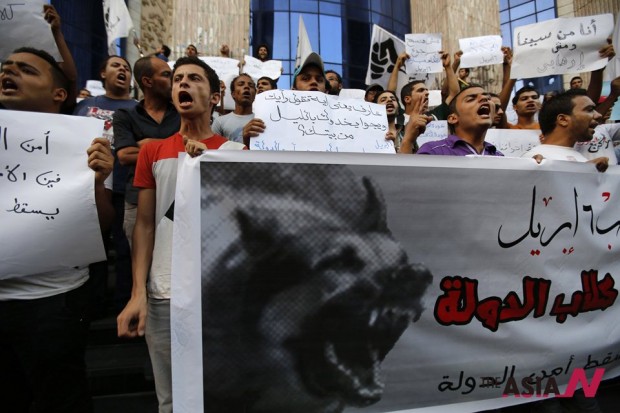
In front of the whole media, MB leaders sent rails of their children and women wearing white coffins with a phrase written on saying: “We are projects of martyrs!”
The real future of Egypt is no longer in need for such ideas. The millions of Egyptians who went twice into the streets in a span of 30 months to move two dictators away will not accept any dictatorship rule in their country again. The people are not divided in believing that. The success of any leader to rule depends on how much he gets the dream slogan of the revolution: bread, freedom and social justice, coming true.
Rising youth involvement
One certain aspect for a better true future of Egypt is to spread the spirit of one nation as the main atmosphere for growing the plants of democracy. There must be no more political parties established on a religious basis, as dividing people according to their religion leads to what we saw under the one-year rule of the MB, that acted like a clan, even using the flags of Al-Qaeda in crowds, and even burning the flag of Egypt. MB leaders say that the idea of a Muslim nation is more important than the identity of a country, something that no national citizen could accept as his own homeland.
In addition to the previous aspects, there must be a new way to characterize the Egyptian authorities, ministries and so on. Youth must be given the chance to handle the situation more and more and no need to mention that the two waves of revolutions were led mostly by the youth. The idea of Tamarrod, “rebellion” that started the flame of 30 June Revolution was a youthful creative idea where three young men requested people to sign a form to announce the refusal of Morsi’s dictatorship, and they got 22 million forms signed from all Egyptians cities.
Those millions came out on the streets on 30 June, and again they came on 26 July to support the call of the minister of defense to stop terrorism in Egypt. The Egyptian army is fighting terrorism in Sinai brought by Islamists who belong to the MB and other radical groups. Such a war shall not be short, as there was a leak that permitted thousands of them to hide in Sinai, and in other cities, with their arms smuggled from Gaza, Libya and Sudan. There are even Syrians who fled the war in their own country, entered Egypt as refugees and joined the MB’s militias seeking financial support.
One more aspect to strengthen the new republic is to keep the transitional justice that rises above the spirit of vengeance and that guarantees human and legal rights of all those who are brought to trial.
It would be too difficult to draw the future map of Egypt without spotting “Muslim Brotherhood” somewhere. For more than 80 years, the Muslim Brotherhood worked as a hidden blocked group, ruled by their own mysterious rules, supported by members from tens of countries, and under the mask of calling people to Islam, they marched ahead to capture political authority, even via violence, to be named Muslim Blood-hood, not Brotherhood. However, a peaceful future of Egypt shall not accept the inclusion of killers and conspirators.



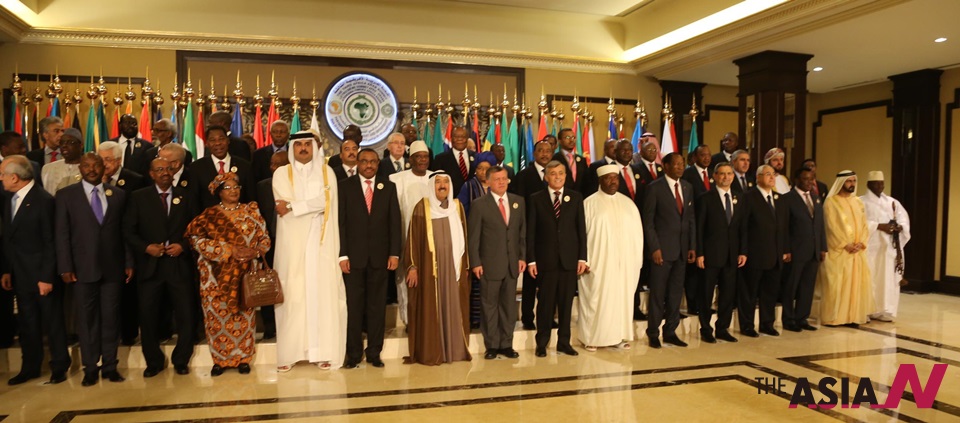
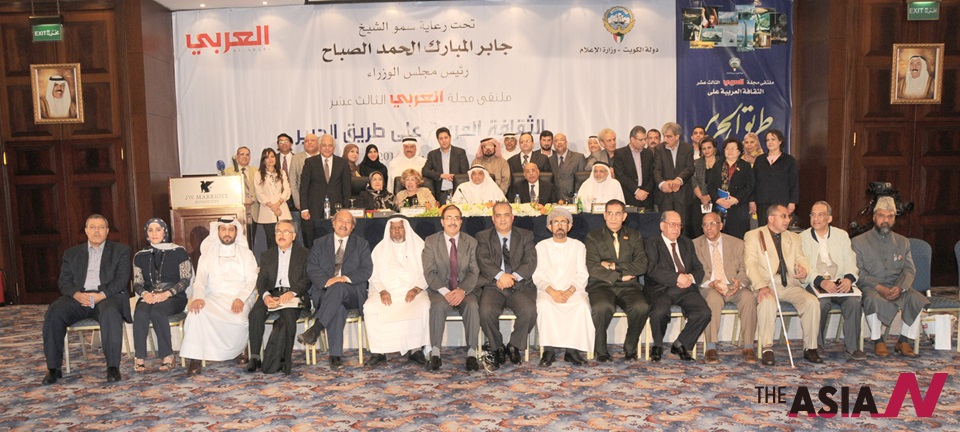
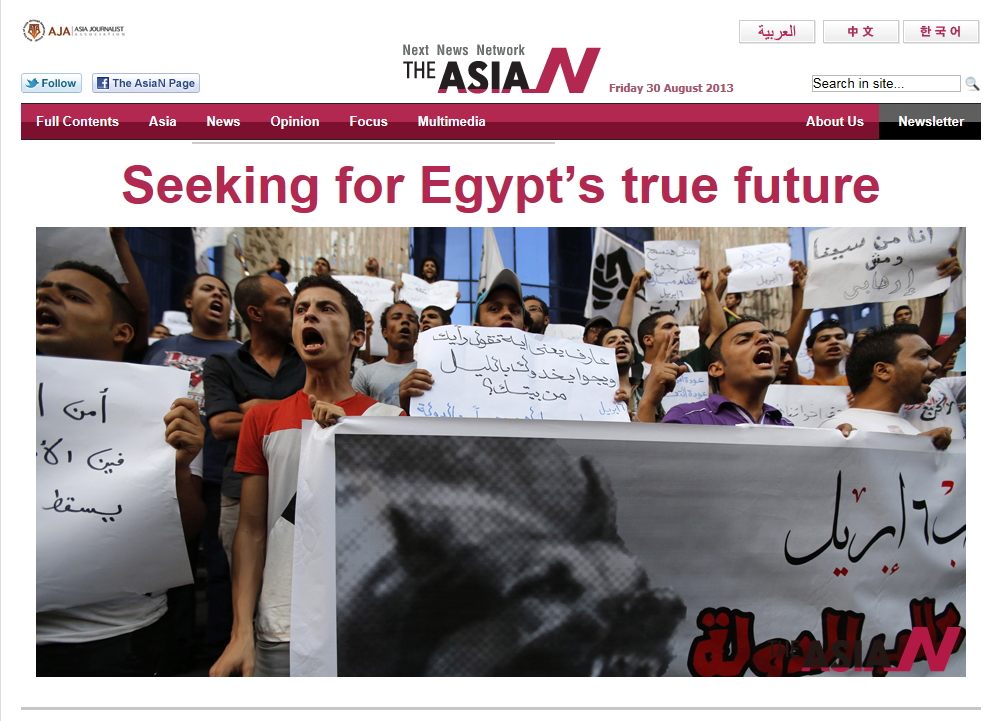
2 comments
comorie
comorien